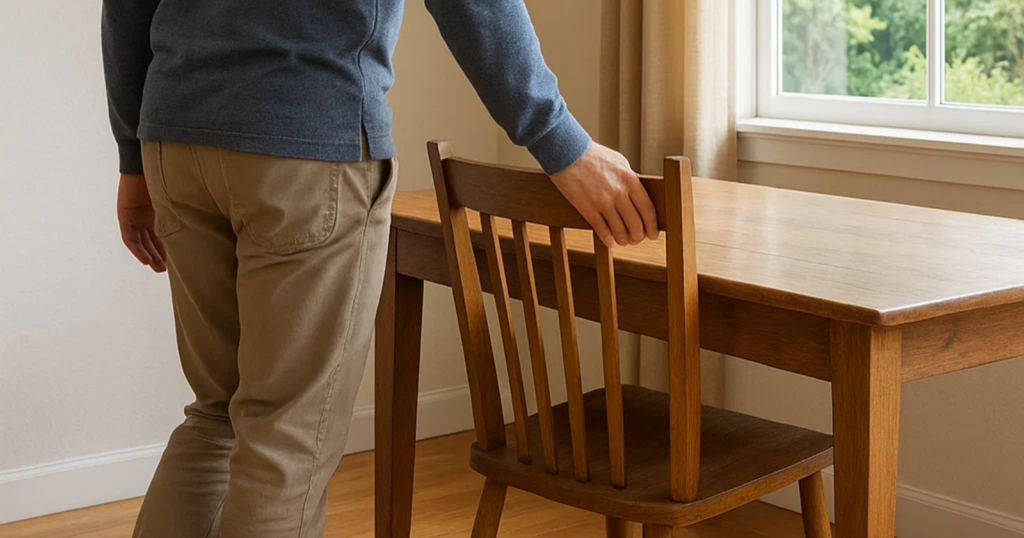It’s such a small gesture, isn’t it?
Pushing in your chair when you leave the table. It doesn’t take much time. Nobody usually notices. And yet—when they do notice, it says something.
Over the years, I’ve come to believe that small actions often reveal the biggest things about us.
And this tiny habit? It tends to show up in people who are wired a certain way.
Let’s dig into what that simple act might be saying about your character.
1. You pay attention to the world around you
Most people are in a rush to get to the next thing. They don’t even notice the chair they just left sticking out halfway into someone’s path.
But not you. You notice.
That awareness—of your surroundings, of how your actions affect others—is a quiet kind of strength.
It shows you’re tuned in, even when nobody’s watching.
2. You care about the experience of others
When someone pushes their chair in, they’re not just doing it for themselves.
They’re thinking about the next person who comes along. The person who might trip. The server who has to navigate the aisle.
It’s a small act of consideration that says, “I don’t want to leave things in someone else’s way.”
I remember once eating at a small café with my granddaughter.
A man at the table next to us stood up, neatly tucked his chair back in, and even straightened the one across from him.
My granddaughter, who was maybe nine at the time, leaned over and whispered, “He’s polite.”
And she was right. Kids notice. So do adults. We just don’t always say it out loud.
3. You value order—even in the little things
Let’s be honest, life is messy.
So when someone takes the time to straighten a chair or line up the salt and pepper shakers, it tells me they find peace in tidiness.
It’s not about being obsessive—it’s about grounding yourself.
When the world feels chaotic, small moments of order can be deeply calming.
I’ve found this to be especially true since retiring. Something as minor as lining up chairs in the backyard after a family barbecue brings a little bit of clarity to my day.
4. You’re not looking for credit
No one applauds the person who pushes in a chair.
There’s no gold star for doing it.
And yet you still do it.
That says a lot. It tells me you do the right thing because it’s right—not because you want recognition.
That kind of quiet integrity is rare, and it goes a long way.
5. You’ve developed a strong sense of personal responsibility
Pushing your chair in might seem like nothing. But when you do it every time—at restaurants, at meetings, at your own kitchen table—it adds up.
It becomes a symbol of something else:
You don’t leave a mess behind.
You finish what you start.
You handle your corner of the world, however small it may be.
That mindset tends to show up in bigger ways, too.
6. You respect shared spaces
Whether it’s a family home, a workplace, or a public café—shared spaces thrive on mutual respect.
People who push in their chairs tend to treat communal areas with care.
They get that it’s not just about their comfort—it’s about the group.
Years ago, I volunteered at a small community library. There was a teenager who came in to study most afternoons. He never made a fuss. But every time he left, he’d gently push in his chair, stack his books neatly, and nod to whoever was nearby.
He didn’t know I noticed. But I did.
That boy had respect written all over him—without saying a word.
7. You understand that details matter
Some folks think small actions don’t mean much. But people who push their chairs in?
They understand that the little things do matter.
Because how you do one thing often reflects how you do everything.
If you’re thoughtful about something as tiny as a chair, odds are you’re also thoughtful in your relationships, in your work, and in your everyday life.
8. You move through the world with humility
There’s something humble about finishing your meal, standing up, and quietly returning the space to how you found it.
You’re not making a statement. You’re not asking for acknowledgment.
You’re just taking care of what’s yours to take care of.
In a world that often rewards loud gestures, that kind of humility speaks volumes.
9. You likely grew up with—or developed—a strong inner compass
I’ll be the first to admit, I didn’t always push my chair in as a younger man.
Back in my twenties, I was in a rush to get places, always thinking about what was next instead of where I was. But my wife—God bless her—was the opposite.
She noticed everything.
If we went out to eat, she’d wait until I pushed my chair in before leaving the restaurant. If I forgot, she’d gently walk over and do it herself, then shoot me a look that didn’t need words.
She never lectured. She just modeled it. Over and over again.
One morning a few years after she passed, I stopped at a diner alone. It was quiet. No one knew me. I finished my eggs and coffee, stood up, and walked about two steps before I turned around, pushed in my chair, and adjusted the one across from me too.
Something about that moment hit me harder than I expected.
I realized I wasn’t doing it for manners or appearances. I was doing it because it had become part of me—something she quietly instilled that lived on long after the reminders stopped.
That’s what a strong inner compass looks like.
Sometimes, it’s not loud or showy. It’s just quietly doing the right thing, long after the person who taught it to you is gone.
10. You don’t need to make a big impact to have a meaningful one
Now I can’t tell you I have all the answers, but I’ve come to believe this:
You don’t need to lead a movement or change the world overnight to matter.
Sometimes, how you treat a chair says something about how you treat the world.
And sometimes, it’s those small, almost invisible choices that ripple outward—more than we realize.
Final thought
In a world full of people rushing to be seen, sometimes the strongest thing you can do is the quiet thing no one notices.
So here’s a question worth sitting with:
What do your smallest habits say about you—when no one else is looking?
















